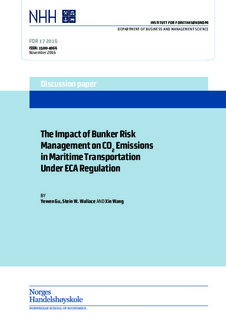The Impact of Bunker Risk Management on CO2 Emissions in Maritime Transportation Under ECA Regulation
Working paper

View/
Date
2016-11-16Metadata
Show full item recordCollections
- Discussion papers (FOR) [566]
Abstract
The shipping industry carries over 90 percent of the world’s trade, and is hence a major contributor to CO2 and other airborne emissions. As a global effort to reduce air pollution from ships, the implementation of the ECA (Emission Control Areas) regulations has given rise to the wide usage of cleaner fuels. This has led to an increased emphasis on the management and risk control of maritime bunker costs for many shipping companies. In this paper, we provide a novel view on the relationship between bunker risk management and CO2 emissions. In particular, we investigate how different actions taken in bunker risk management, based on different risk aversions and fuel hedging strategies, impact a shipping company’s CO2 emissions. We use a stochastic programming model and perform various comparison tests in a case study based on a major liner company. Our results show that a shipping company’s risk attitude on bunker costs have impacts on its CO2 emissions. We also demonstrate that, by properly designing its hedging strategies, a shipping company can sometimes achieve noticeable CO2 reduction with little financial sacrifice.